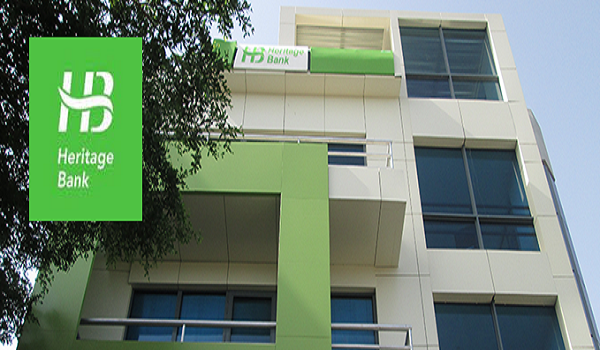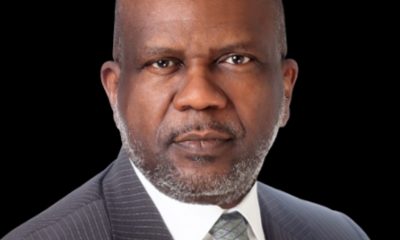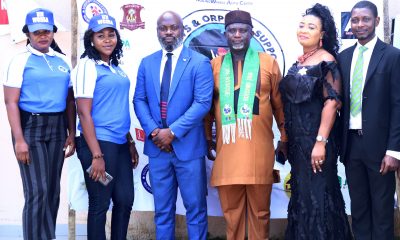Business
Heritage Bank’s “The Refinery,” CBN, 25 others receive CIBN’s Certificates of Accreditation

The Chartered Institute of Bankers of Nigeria (CIBN) yesterday official presented Certificates of Accreditation to Heritage Bank Plc Academy known as “The Refinery” and the Central Bank of Nigeria (CBN) Learning Centre.
The Institute via a Zoom virtual platform also accredited more 25 Educational Training Service Providers (ETSP), which is in accordance with its role as the Accreditation Agency for the implementation of the Competency Framework released, as part of the strategy to redirect the banking industry towards the path of entrenching a sequenced competency development programme and build capacity for the stability of the financial system.
The Institutions include Crown Agent UK; B. Adedipe Associates Limited; Chartered Institute for Securities and Investments (CISI), United Kingdom; The Nigerian Stock Exchange X Academy; Mactay Consulting Limited; Knowledge Beyond Limited; Brideswell Consulting Limited; Ultravantage Solutions ; EdgeEcution Global Resources Limited and Katalyst Consulting.
Others are: Michael Stevens Consulting; NLP Nigeria Limited; Procept Associates Professional Services Limited; Don Mitchell & Co Limited; Bode Zakari Management Consultants; Success for ALL Limited; Edcof Educational Services Limited and Kloverharris Limited.
The Refinery supervised by the Bank’s Human Capital Management Group was accredited by CIBN after assessing and evaluating its syllabus, curriculum and structure by panel of technocrats and seasoned bankers set up by the Institute, which according to the chartered institute aligns with the Competency Framework of the Central Bank of Nigeria (CBN) and the professional paper standard of CIBN.
Speaking during the presentation, the CIBN President, Bayo Olugbemi said the event marks yet another significant milestone in the annals of the Institute and our continuing quest for the strengthening of the intellectual resources and capabilities of the human capital in the banking and finance industry. He stressed that apart from efforts towards addressing competency challenges, thereby enthroning a minimum standard for practitioners in the banking industry.
He applauded Heritage Bank for setting a high standard of learning facility which its structure and curriculum “is next to that of CBN’s training institute,” whilst stressing that the bank’s training school is the best in Nigerian banking industry and at par with international best standard.
He equally informed the gathering that the Certificates of Accreditation presented to Two (2) Bank Academies and Twenty-Six (26) ETSPs bringing the total number of institutions under the Programme to Nineteen (19) Bank Academies; Seventy-Five (75) Educational Training Service Providers; Sixty-Nine (69) Solicited Accreditation; Six (6) Unsolicited Accreditation.
Ifie Sekibo, the MD/CEO of the bank, has described Heritage Bank as a forward looking business whose strength lies in the ability to spot and mould talents into great professionals.
Sekibo, represented by the Executive Director, Jude Monye explained that the word “The Refinery” was chosen for the purpose of refining its employees to emerge as gold and harness the required skills to excel in their job functions.
He noted that the Refinery was established to train, nurture and arm young employees with the right skills needed to fast-track development and enable teams to flourish.
“Just as the word Refinery connotes, the Heritage Bank Plc Refinery is a Facility where crude talents or abilities are converted or ‘refined’ into ‘finished’ jewels for optimal performance.
“The training program is designed to take each participant on an enriching, rigorous and intellectually engaging learning journey to equip them with the fundamental competencies required of a professional banker. The Curriculums are structured to accommodate both Core and Non-Core Banking competencies such as finance, credit and accounting, organizational and behavioral competencies to mention a few”, Sekibo stated.
Meanwhile, about 300 employees who are fresh from universities across and outside the country with diverse academic backgrounds and impressive academic records underwent rigorous training in an intensive 12-week academic (practical and theoretical) programme with over 30 courses in Port Harcourt.
The Refinery is a tailored learning experience Institute with the perfect blend of technologies, techniques and methodologies to optimise training experiences, which will help employees, succeed in ensuring that the bank’s business stays ahead of the curve with the banking sector along with Heritage Bank’s target goals.
Business
Nigeria’s Inflation Drops to 15.10% as NBS Reports Deflationary Trend

Nigeria’s headline inflation rate declined to 15.10 per cent in January 2026, marking a significant drop from 27.61 per cent recorded in January 2025, according to the latest Consumer Price Index (CPI) report released by the National Bureau of Statistics.
The report also showed that month-on-month inflation recorded a deflationary trend of –2.88 per cent, representing a 3.42 percentage-point decrease compared to December 2025. Analysts say the development signals easing price pressures across key sectors of the economy.
Food inflation stood at 8.89 per cent year-on-year, down from 29.63 per cent in January 2025. On a month-on-month basis, food prices declined by 6.02 per cent, reflecting lower costs in several staple commodities.
The data suggests a sustained downward trajectory in inflation over the past 12 months, pointing to improving macroeconomic stability.
The administration of President Bola Ahmed Tinubu has consistently attributed recent economic adjustments to ongoing fiscal and monetary reforms aimed at stabilising prices, boosting agricultural output, and strengthening domestic supply chains.
Economic analysts note that while the latest figures indicate progress, sustaining the downward trend will depend on continued policy discipline, exchange rate stability, and improvements in food production and distribution.
The January report provides one of the clearest indications yet that inflationary pressures, which surged in early 2025, may be moderating.
Bank
Alpha Morgan to Host 19th Economic Review Webinar

Alpha Morgan to Host 19th Economic Review Webinar
In an economy shaped by constant shifts, the edge often belongs to those with the right information.
On Wednesday, February 25, 2026, Alpha Morgan Bank will host the 19th edition of its Economic Review Webinar, a high-level thought leadership session designed to equip businesses, investors, and individuals with timely financial and economic insight.
The session, which will hold live on Zoom at 10:00am WAT and will feature economist Bismarck Rewane, who will examine the key signals influencing Nigeria’s economic direction in 2026, including policy trends, market movements, and global developments shaping the local landscape.
With a consistent track record of delivering clarity in uncertain times, the Alpha Morgan Economic Review continues to provide practical context for decision-making in a dynamic environment.
Registration for the 19th Alpha Morgan Economic Review is free and can be completed via https://bit.ly/registeramerseries19
It is a bi-monthly platform that is open to the public and is held virtually.
Visit www.alphamorganbank to know more.
Business
GTBank Launches Quick Airtime Loan at 2.95%

GTBank Launches Quick Airtime Loan at 2.95%
Guaranty Trust Bank Ltd (GTBank), the flagship banking franchise of GTCO Plc, Africa’s leading financial services group, today announced the launch of Quick Airtime Loan, an innovative digital solution that gives customers instant access to airtime when they run out of call credit and have limited funds in their bank accounts, ensuring customers can stay connected when it matters most.
In today’s always-on world, running out of airtime is more than a minor inconvenience. It can mean missed opportunities, disrupted plans, and lost connections, often at the very moment when funds are tight, and options are limited. Quick Airtime Loan was created to solve this problem, offering customers instant access to airtime on credit, directly from their bank. With Quick Airtime Loan, eligible GTBank customers can access from ₦100 and up to ₦10,000 by dialing *737*90#. Available across all major mobile networks in Nigeria, the service will soon expand to include data loans, further strengthening its proposition as a reliable on-demand platform.
For years, the airtime credit market has been dominated by Telcos, where charges for this service are at 15%. GTBank is now changing the narrative by offering a customer-centric, bank-led digital alternative priced at 2.95%. Built on transparency, convenience and affordability, Quick Airtime Loan has the potential to broaden access to airtime, deliver meaningful cost savings for millions of Nigerians, and redefine how financial services show up in everyday life, not just in banking moments.
Commenting on the product launch, Miriam Olusanya, Managing Director of Guaranty Trust Bank Ltd, said: “Quick Airtime Loan reflects GTBank’s continued focus on delivering digital solutions that are relevant, accessible, and built around real customer needs. The solution underscores the power of a connected financial ecosystem, combining GTBank’s digital reach and lending expertise with the capabilities of HabariPay to deliver a smooth, end-to-end experience. By leveraging unique strengths across the Group, we are able to accelerate innovation, strengthen execution, and deliver a more integrated customer experience across all our service channels.”
Importantly, Quick Airtime Loan highlights GTCO’s evolution as a fully diversified financial services group. Leveraging HabariPay’s Squad, the solution reinforces the Group’s ecosystem proposition by bringing together banking, payment technology, and digital channels to deliver intuitive, one-stop experiences for customers.
With this new product launch, Guaranty Trust Bank is extending its legacy of pioneering digital-first solutions that have redefined customer access to financial services across the industry, building on the proven strength of its widely adopted QuickCredit offering and the convenience of the Bank’s iconic *737# USSD Banking platform.
About Guaranty Trust Bank
Guaranty Trust Bank (GTBank) is the flagship banking franchise of GTCO Plc, a leading financial services group with a strong presence across Africa and the United Kingdom. The Bank is widely recognized for its leadership in digital banking, customer experience, and innovative financial solutions that deliver value to individuals, businesses, and communities.
About HabariPay
HabariPay is the payments fintech subsidiary of GTCO Plc, focused on enabling fast, secure, and accessible digital payments for individuals and businesses. By integrating payments and digital technology, HabariPay supports innovative services that make everyday financial interactions simpler and more seamless.
Enquiries:
GTCO
Group Corporate Communication
[email protected]
+234-1-2715227
www.gtcoplc.com
-

 celebrity radar - gossips6 months ago
celebrity radar - gossips6 months agoWhy Babangida’s Hilltop Home Became Nigeria’s Political “Mecca”
-

 society6 months ago
society6 months agoPower is a Loan, Not a Possession: The Sacred Duty of Planting People
-

 society5 months ago
society5 months agoReligion: Africa’s Oldest Weapon of Enslavement and the Forgotten Truth
-

 news6 months ago
news6 months agoTHE APPOINTMENT OF WASIU AYINDE BY THE FEDERAL GOVERNMENT AS AN AMBASSADOR SOUNDS EMBARRASSING









